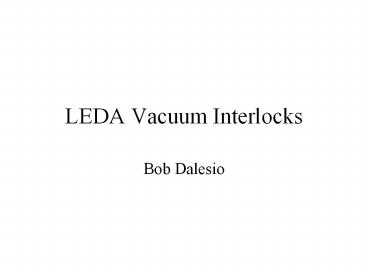LEDA Vacuum Interlocks PowerPoint PPT Presentation
Title: LEDA Vacuum Interlocks
1
LEDA Vacuum Interlocks
- Bob Dalesio
2
Outline
- Leda vacuum system displays and interfaces
- PLC Interlocks as presented to the operator
- EPICS interlock to fast protect
- EPICS logic for fast protect as drawn in Capfast
- Fast faults as they appear on stiptool
- PLC communications diagnostics
- Conclusions
3
(No Transcript)
4
(No Transcript)
5
PLC Interlocks
- These are used for equipment protection.
- Displays of the interlock chains are available
from the control screens. - The HEBT Valve is special - the rfq vacuum only
warns that the valve is open but not armed for
shutdown.
6
(No Transcript)
7
(No Transcript)
8
Interface to fast protect
- Normal operation
- Loss of vacuum trips beam. Vacuum drops below
10e-6 or 10e-5. - Interlocks that are disabled and the causes
- bad readings from the ION Gauges
- disconnected cables will not trip - but vacuum
goes to 10e-10. Best vacuum reading is 10e-8.
9
Vacuum System Hardware
RS232
Fprot
adc
GPIB
Isolation Valve
Ion Gauge RB
ig1
cc
ig2
Ion Gauge
IOC
Vacuum Readings Ion Gauge Select 1 or 2
Vacuum Limits tripped Ion Gauge Select Cmd/RB
All PLC RB and commands
Isolation Valve RB
PLC
10
Hardware Interfaces
- 1 Systran adc into IP - 60 Hz scan of ion gauge
readings used for fast protect. Lights are on
solid - MV133 4 port Serial interface to modicon PLCs -
most of the vacuum readings and controls are
through here. - 4 IP - GPIB readings of the vacuum gauges
- 1 IP - fast protect interface for vacuum
11
(No Transcript)
12
(No Transcript)
13
(No Transcript)
14
(No Transcript)
15
(No Transcript)
16
(No Transcript)
17
(No Transcript)
18
Conclusions
- Making up an interlock in the IOC requires
consideration of all software and hardware
failures possible. - Interlocks made up in a PLC should be easily
understood at the operator workstations. At LEDA
this was done with DM screens that mimic ladder
logic.
PowerShow.com is a leading presentation sharing website. It has millions of presentations already uploaded and available with 1,000s more being uploaded by its users every day. Whatever your area of interest, here you’ll be able to find and view presentations you’ll love and possibly download. And, best of all, it is completely free and easy to use.
You might even have a presentation you’d like to share with others. If so, just upload it to PowerShow.com. We’ll convert it to an HTML5 slideshow that includes all the media types you’ve already added: audio, video, music, pictures, animations and transition effects. Then you can share it with your target audience as well as PowerShow.com’s millions of monthly visitors. And, again, it’s all free.
About the Developers
PowerShow.com is brought to you by CrystalGraphics, the award-winning developer and market-leading publisher of rich-media enhancement products for presentations. Our product offerings include millions of PowerPoint templates, diagrams, animated 3D characters and more.

